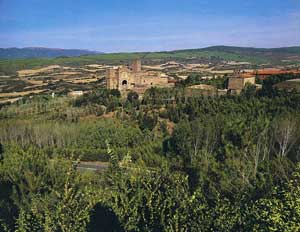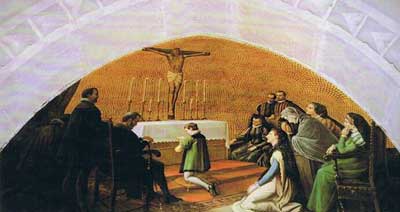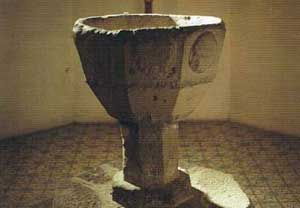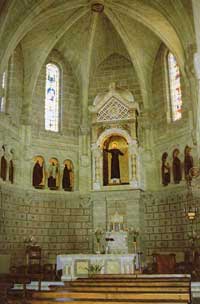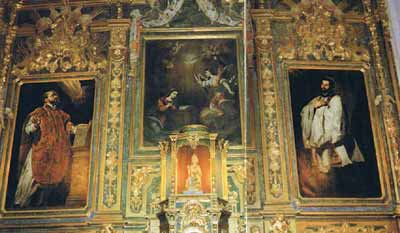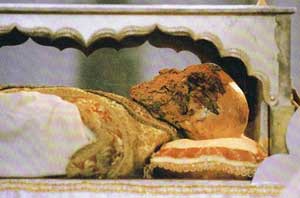

![]()
![]()
|
On
the occasion of the 500th anniversary Letter
Of St Francis Xavier
May the grace and love of Christ our Lord ever assist and favor us. Amen. Two years and nine months ago I sailed from Portugal, and, including this letter, I have written to you three times since then. During the time that I have been in India, I have received only one letter from you, written on January 13, 1542; and God our Lord knows how much consolation I received from it. The letter was given to me around two months ago. It was so late in arriving in India because the ship which brought it wintered in Mozambique. Micer Paulo, Francisco de Mansilhas, and I are in good health. Micer Paulo is in the College of the Holy Faith in Goa and has charge of the students there. Francisco de Mansilhas and I are with the Christians of Cape Comorin. I have been with these Christians for more than a year and can tell you that there are many of them, and that many more are being converted each day. As soon as I arrived here on this coast, I sought to learn from them what they knew about Christ our Lord. When I asked them what they believed about the articles of the faith, or maintained more firmly now that they were Christians than when they were pagans, the only answer that I could get from them was that they were Christians and that, since they did not understand our language, they did not know our law or what they should believe. Since they did not understand me nor I them, their native language being Malabar and mine Basque, I assembled those who were more knowledgeable and sought out individuals who understood both our language and theirs. After they had helped me with great toil for many days, we translated the prayers from Latin into Malabar, beginning with the Sign of the Cross, confessing that there are three Persons in one sole God, then the Creed, the Commandments, the Our Father, Hail Mary, Salve Regina, and the Confiteor. After I had translated these into their language and had learned them by heart, I went through the entire village with a bell in my hand in order to assemble all the boys and men that I could. After they had been brought together, I taught them twice a day. Within the space of a month, I taught them the prayers and ordered the boys to teach their fathers and mothers and all those of their house and their neighbors what they had learned at school. On Sundays I brought all the villagers together, both men and women, young and old, to recite the prayers in their own language. They were obviously pleased and very happy to come. Beginning with the confession of one sole God, three and one, they recited the Creed in a loud voice in their own language, and continued to repeat after me what I said. When we had finished the Creed, I repeated it by myself. Reciting each article by itself, I paused at each of the twelve and advised them that being a Christian means nothing more than to firmly believe without doubting any of the twelve articles. After they had professed that they were Christians, I asked them if they firmly believed in each of the twelve articles. They then all together, both men and women, young and old, would, at each one of the twelve articles, answer me that they did in a loud voice with their arms folded over each other upon their breasts in the form of a cross; and I had them recite the Creed in this way more frequently than any other prayer, since only by believing in the twelve articles is a man called a Christian. The first thing that I taught them after the Creed were the Commandments, telling them that the law of the Christians has only ten Commandments, and that one is called a good Christian if he keeps them as God commands, and that, on the contrary, one who does not observe them is a bad Christian. Both Christians and pagans are astonished to see how holy is the law of Jesus Christ and its complete conformity with natural reason. After the Creed and the Commandments, I recite the Our Father and Hail Mary, and they repeat them just as I have said them. We recite twelve Our Fathers and twelve Hail Marys in honor of the twelve articles of the faith, and after these we recite ten more Our Fathers and ten more Hail Marys in honor of the Ten Commandments, observing the following order: We begin by reciting the first article of the faith; and after we have recited it, I say in their language, and they with me: Jesus Christ, Son of God, give us the grace to firmly believe without any doubt the first article of the faith; and so that he may grant us this grace, we say an Our Father. After finishing the Our Father, we all say together: Holy Mary, Mother of Jesus Christ, obtain for us from your son Jesus Christ the grace to firmly believe, and without any doubt, the first article of the faith; and so that she may obtain for us this grace, we recite the Hail Mary. We keep this same order for all the other articles. After we have finished the Creed and the twelve Our Fathers and Hail Marys as I have said, we recite the Commandments in the following way: I begin by reciting the First Commandment, and all recite it after me. After it has been recited, we all say together: Jesus Christ, Son of God, grant us the grace to love you above all things. After we have asked for this grace, we all recite the Our Father. After we have finished this, we say: Holy Mary, Mother of Jesus Christ, obtain for us the grace from your Son so that we can keep the First Commandment. After we have asked this grace from Our Lady, we all recite the Hail Mary; and we keep this same order for all the other nine Commandments. In this way we recite twelve Our Fathers and twelve Hail Marys in honor of the twelve articles of the faith, asking God our Lord for the grace to firmly believe them without any doubt, and ten Our Fathers with ten Hail Marys in honor of the Ten Commandments, asking God our Lord that he may grant us the grace to observe them. These are the petitions which I teach them to make in our prayers, telling them that if they ask these graces from God our Lord, he will grant them all the rest more fully than they could ask for them by themselves. I have them all recite the Confiteor, especially those who are to be baptized, and afterwards the Creed; and at every article I ask them if they firmly believe. After they have answered me that they do and I have I spoken to them about the law of Jesus Christ which they must keep in order to be saved, I baptize them. We recite the Salve Regina when we wish to end our prayers. I hope in God our Lord that the boys will be better men than their fathers, since they manifest much love and affection for our law and for learning and teaching the prayers. They have such a great abhorrence for the idolatries of the pagans that they frequently quarrel with them; they reproach their fathers and mothers when they see them worshiping idols, and they denounce them by coming to tell me about it. When they tell me about idolatries that are being practiced outside the villages, I collect all the boys of the village and go with them to the place where the idols have been erected; and the devil is more dishonored by the boys whom I take there than he was honored by their fathers and relatives when they made and worshiped them, for the boys take the idols and smash them to bits. They then spit upon them and trample them under their feet; and after this they do other things which, though it is better not to mention them by name, are a credit to the boys who do them against one who is so impudent as to have himself worshiped by their fathers. For four months I remained in a large Christian village translating the prayers of our language into theirs and teaching them. During this time there were so many who came and asked me to come to their homes to recite some prayers over their sick, and others who came in search of me because of their infirmities, that the mere reading of the Gospels, the teaching of the boys, baptizing, translating the prayers, answering their questions, which were never failing, and then the burial of the dead left me no time for other occupations. I was thus extremely busy in complying with the devotion of those who summoned me or came to visit me, and I could not deny their holy requests lest they lose their faith in our religion and Christian law. Since matters had come to such a state that I could not satisfy them all, nor avoid hurting their feelings over whose house I should visit first, seeing the devotion of the people, I found a way to satisfy them all. I ordered the boys who knew the prayers to go to the homes of the sick, and all those of the house and of the neighborhood to assemble there, and all to recite the Creed many times, and to tell the sick person that he should believe and that he would recover; and after this to say the other prayers. In this way I satisfied them all and had the Creed, the Commandments, and the other prayers taught in the houses and squares. God our Lord thus granted many favors to the sick, giving them health in soul and in body through the faith of those of the house, of their neighbors, and their own. God showed them great mercy in their sufferings, since he called them through their infirmities and brought them by force as it were to the faith. Leaving one in this village who could continue with what had been begun, I went to visit the other villages and proceeded in the same way, for there are never lacking holy and pious occupations in these regions. I could never come to an end in describing to you the fruit that is being gained by baptizing newborn children and teaching those who are old enough to learn. I leave a copy of the prayers in the villages which I visit, and I order those who know how to write to copy them, to learn them by heart, and to recite them every day. And I give them orders on how all should be assembled on Sundays to recite them. I therefore leave someone in the villages to see that this is done. Many fail to become Christians in these regions because they have no one who is concerned with such pious and holy matters. Many times I am seized with the thought of going to the schools in your lands and of crying out there, like a man who has lost his mind, and especially at the University of Paris, telling those in the Sorbonne who have a greater regard for learning than desire to prepare themselves to produce fruit with it: “How many souls fail to go to glory and go instead to hell through their neglect!” And thus, as they make progress in their studies, if they would study the accounting which God our Lord will demand of them and of the talent which has been given to them, many of them would be greatly moved and, taking means and making spiritual exercises to know the will of God within their soul, they would say, conforming themselves to it rather than to their own inclinations: “Lord, here I am! What would you have me do? Send me wherever you will, and If need be, even to the Indies! With how much greater consolation would they then live! and they would have great hope in the divine mercy at the hour of their death, when they will encounter that particular judgment which no man can escape and will say on their own behalf: “Lord, you gave me five talents. Behold, here are another five that I have gained with them!” I fear that many who study in the universities study more to obtain honors, benefices, or bishoprics with their learning than with the desire of adapting themselves to the demands of these honors and ecclesiastical states. Those who study are accustomed to say: “I wish to become learned so that I can thus obtain a benefice or ecclesiastical honor and then serve God with such an honor.” They therefore make their decision according to their own inordinate affections fearing that God might not desire what they desire; for their inordinate affections do not let them leave this choice to the will of God our Lord. I was almost moved to write to the University of Paris, or at least to our Master de Cornibus and to Doctor Picard, how many millions of pagans would become Christian if there were laborers, so that they may take pains to find persons who seek not what is their own but what is of Jesus Christ. There is such a great multitude of those who are being converted to the faith of Christ in this land where I am that it frequently happens that my arms become exhausted from baptizing, and I can no longer speak from having recited so often the Creed and the Commandments in their language, and the other prayers, along with an exhortation which I know in their language, in which I explain to them what it is to be a Christian, what paradise is, and what hell is, telling them what kind of people they are who go to the former and what kind to the latter. I recite the Creed and the Commandments more frequently than the other prayers. There are days when I baptize an entire village, and on the coast where I now am there are thirty Christian villages. The governor here in India is a great friend of those who become Christians. He makes a donation of four thousand pieces of gold each year, and these are only to be used for, and paid to, those persons who are very diligent in teaching Christian doctrine in the villages which have been recently converted to the faith. He is a great friend of all those of our Society; he has a great desire that some of our Company come to these regions, and I believe that he is writing to the king in this regard. Last year I wrote to you about a college that is being built in the city of Goa. There are already many students in it, who speak different languages and were all born of pagan parents. Among those in the college, for which many buildings have already been erected, there are many who are learning Latin, and others who are learning how to read and write. Micer Paulo is with the students of this college. He says Mass for them every day and hears their confessions, and he never ceases to give them spiritual instructions. He has care of the physical needs of the students. This college is very large: more than five hundred students could be housed in it, and it has the revenues to support them. The college receives many alms, and the governor is very generous in its regard. All Christians have reason for giving thanks to God our Lord for the holy founding of this house, which is called the College of the Holy Faith. Through the mercy of God our Lord, I hope that before many years have passed the number of Christians will have been greatly increased, and that the boundaries of the Church will be extended by those who are studying in this holy college. Among the pagans in these regions there is a class called Brahmans, who are supported by all the pagans. They have charge of the temples in which there are idols. They are the most perverse people in the world. The Psalm which says, “From the impious people, from the iniquitous and fraudulent man, free me” is to be understood of them. They are people that never speak the truth, and they are always thinking on how they can cunningly lie and deceive the poor, the simple, and the ignorant, saying that the idols are asking them to bring them certain offerings, which are simply what the Brahmans desire and fancy for the support of their wives, sons, and homes. They make the simple believe that the idols eat, and there are many who offer a certain coin to the idol before they dine or sup. They eat twice a day to the joyous sound of timbrels, making the poor believe that the idols are eating. When the Brahmans lack something which they need, they tell the people that the idols are very angry with them because they do not send them what they have requested; and that they should be on their guard if they do not furnish it to them, since, if they fail to do so, they will kill them, or make them ill, or send demons into their homes. These poor unfortunate people, believing that it will be so, and fearing the evil which the idols will do to them, do what the Brahmans ask of them. These Brahmans are men of little learning; and what they lack in virtue, they have much more in malice and iniquity. The Brahmans of this coast where I now am are greatly distressed that I never do anything except reveal their abominations. When we are alone, they tell me in confidence how they deceive the people. They admit to me in secret that they have no other patrimony than their stone idols, and that they live on the lies which they tell about them. These Brahmans are convinced that I know more than all of them together. They ask me to visit them, and they are much upset because I refuse to take the gifts which they send me. They do all this so that I may not reveal their secrets, saying that they know very well that there is only one God, and that they pray to God for me. In return for all this, I tell them what I think. I then reveal their tricks and deceits to the poor, simple people, who are devoted to them only through fear, until I am exhausted; and many lose their respect for the demon and become Christians because of what I tell them. If there were no Brahmans, all the pagans would be converted to our faith. The houses in which the idols and the Brahmans are found are called “pagodas.” All the pagans in these regions have very little learning, but they know much about evil. During the time that I have been in these regions only one Brahman has become a Christian, an excellent young man, who has undertaken the task of teaching the boys Christian doctrine. I pass by many pagodas on my visits to the Christians, and I once passed by one that has more than two hundred Brahmans. They came to see me, and among the many matters which we discussed was a question which I posed to them, namely, that they should tell me what they were bidden to do by the gods and idols whom they adore in order to attain glory. After they had vigorously argued among themselves about who should reply to me, they told one of the oldest to give me an answer. The old man, who was over eighty, told me that I should first tell him what the God of the Christians orders them to do. Seeing through his ruse, I refused to say anything until he had spoken. He was then compelled to manifest his ignorance. He told me that their gods ordered them to do two things so that they might go to where they are: the first is not to kill any cows, in which they are adored; and the second is to give alms, and these to the Brahmans who serve in the pagodas. When I heard this answer, I was saddened by the fact that the demons rule over our neighbors to such an extent that they have themselves worshiped by them instead of God. Standing up, I told the Brahmans to remain seated; and in a loud voice I recited the Creed and the Commandments of the Law in their language, pausing at each Commandment. After I had finished the Commandments, I gave them an exhortation in their language and explained to them what paradise is and what hell is; and I told them who go to one of these places and who to the other. After I had completed my discourse, all the Brahmans stood up and heartily embraced me; and they told me that truly the God of the Christians is the true God, since his Commandments are so completely conformed to natural reason. They asked me if our soul, like the soul of a brute animal, dies together with the body. God our Lord gave me reasons that were so suited to their capacities that I made them clearly understand the immortality of the soul, and they showed that they were greatly pleased and happy with this. The arguments which are to be employed with these ignorant people need not be as subtle as those that are found in the writings of professors who are very Scholastic. They asked me where the soul of a man goes when he dies; and if, when a man sleeps and dreams that he is in a land with his friends and acquaintances (something which happens frequently to me, that is, my being with you, who are very dear to me), it is because his soul leaves him and ceases to inform his body. They further asked me to tell them if God was black or white, since men are themselves of different colors. Since all those of this land are black, and they favor this color, they say that he is black. As a consequence, the majority of their idols are also black. Since they frequently anoint them with oil, they smell dreadfully; and they are so ugly that they are a fright to behold. I answered all their questions in a way that seemed to satisfy them. But when I reached the conclusion with them that they should become Christians, since they knew the truth, they gave the same answer that many among us are accustomed to give: “What will the world say of us if we make this change in our way of life?” They were further tempted by the thought that they would then lack what they needed. I found only one Brahman in a village on this coast who knew anything, since, as I was told, he had studied in some renowned schools. I arranged to meet him and discovered a way to do so. He told me in great secrecy that the first thing that the teachers in these schools do is to have those who come to learn take an oath that they will never reveal certain secrets that are taught there. Because of his friendship for me, this Brahman revealed these secrets to me under the greatest secrecy. One of the secrets was as follows: They would never say that there is only one God, Creator of heaven and earth, who is in the heavens; and that he should adore this God and not the idols, who are demons. They have some writings in which they preserve their commandments. The language used for teaching in their schools is like the Latin used in ours. He recited their commandments for me very well, giving a good explanation to each one of them. Those who are wise observe Sundays, something that is quite incredible. On Sundays they say no other prayer than the following, which they repeatedly recite: “Om cirii naraina noma,” which means: “I adore thee, God, with thy grace and assistance for ever,” and they recite this prayer very gently and softly in order to keep the oath they have taken. He told me that the natural law keeps them from having many wives; and that in their writings it is stated that a time will come when all are to live under one law. This Brahman further told me that many incantations are taught in those schools. He asked me to tell him the main things which the Christians have in their law, and he promised me that he would not reveal them to anyone. I replied that I would not tell them to him unless he first promised me that he would not conceal the main things contained in the Christian law which I would tell him. He therefore promised me that he would publish them. I was then much pleased to tell and explain to him these important words of our law: “He who believes and is baptized will be saved.” He wrote these words down in his own language along with their explanation, since I gave him the entire Creed. I included the Commandments in this explanation because of the affinity which they have with the Creed. He told me that he had one night dreamed with great delight and happiness that he was to become a Christian, and that he would be my companion and would accompany me. He asked me to make him a secret Christian, but under certain conditions, which, since they were neither licit nor honest, I refused to grant. I hope in God that he will become one without any of them. I told him to teach the simple people that they should adore only one God, the Creator of heaven and earth, who is in the heavens. But he, because of the oath which he had taken, did not wish to do this, since he feared that the demon might kill him. I can tell you nothing more about these regions than that the consolations which God our Lord gives to those who go among these pagans and convert them to the faith of Christ are so great that, if there is ever any joy in this life, this can be said to be it. Many times it happens that I hear a person who goes among these Christians exclaim: “0 Lord, do not give me many consolations in this life! Or, now that you in your infinite goodness and mercy give them, take me into your holy glory, for it is most painful to live without seeing you after you have communicated yourself so intimately to your creatures!” Oh, if those who pursue knowledge employed the same great efforts in helping themselves to relish these consolations, how many toils would they endure by day and night in order that they might know them! Oh, if those joys which a student seeks in understanding what he is studying, he should seek to find in assisting his neighbors to appreciate what is necessary for them so that they may know and serve God, with how much greater consolation and readiness would they prepare themselves for the accounting which they must give when Christ bids them: “Give an account of your stewardship!” In these regions, my dearest brothers, my recreations consist in frequently calling you to mind and the time when, through the great mercy of God our Lord, I knew you and conversed with you. I know interiorly, and feel within my soul, how much through my own fault I lost of the time that I conversed with you, since I did not appreciate the many insights which God had given you about Himself. God has granted me a great grace through your prayers and the constant remembrance which you have of me when you commend me to Him. I know that God our Lord, despite your physical absence, lets me perceive through your help and assistance my infinite multitude of sins and gives me the strength to go among the infidels, for which I give great thanks to God our Lord and to you my dearest brothers. Among the many graces, which God our Lord has granted me in this life, and continues to grant me every day, is one which I greatly desired to see fulfilled during my lifetime, that is, the confirmation of our rule and way of life. Thanks be to God our Lord for all eternity that he deemed it well to manifest in public what he gave to his servant Ignatius, our Father, to experience in secret. During the past year I wrote to you the number of Masses which we, that is, Micer Paulo and I, have said in these regions of the Indies for the Most Reverend Cardinal Guidation. I do not know the number that we have said this past year. Know well that all of our Masses are for him. Let us know for our consolation how his Most Reverend Lordship distinguishes himself in the service of God, so that the devotion of Micer Paulo and myself for him may be increased, since we are his permanent chaplains. Do not fail to write to us about the fruit which he works within the Church. I bring this to a close asking God our Lord that, since He in his mercy brought us together, and for His service has again separated us so far from each other, He may also unite us again in His holy glory. In order to obtain this grace and favor, let us take as our advocates and intercessors all the holy souls of these regions in which I am that I have baptized with my own hand, and whom God our Lord has taken to Himself in His holy glory before they lost their state of innocence. There number is, I believe, more than a thousand. I ask all these holy souls that they may obtain from God our Lord the grace that all the time we are in this place of banishment we may feel within our souls His most holy will and perfectly fulfill it.
|
